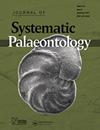Careful amendment of morphological data sets improves phylogenetic frameworks: re-evaluating placement of the fossil Amiskwia sagittiformis
IF 2.2
2区 地球科学
Q3 EVOLUTIONARY BIOLOGY
引用次数: 0
Abstract
The Cambrian fossil Amiskwia sagittiformis has puzzled palaeontologists for more than a century, but recent re-investigation of its morphology suggested a close relationship with the bilaterian clade Gnathifera, comprising Rotifera, Gnathostomulida and Micrognathozoa. Since Amiskwia has already been considered closely related to Chaetognatha, this new interpretation of its morphology supports recent molecular and developmental studies finding a close phylogenetic relationship between Chaetognatha and Gnathifera. The recent re-description of the jaw apparatus of Amiskwia with the first phylogenetic analysis by Vinther & Parry (2019) found a rather surprising topology with Amiskwia and Chaetognatha being sister groups and nested inside Gnathifera. Furthermore, a subsequent paper from Caron & Cheung (2019) re-described the jaws of Amiskwia as very similar to the configuration found in Gnathostomulida, but did not include any phylogenetic analysis. Here we test the topology of Vinther & Parry with various parsimony and Bayesian analyses, taking into account the new description of Caron & Cheung with careful re-amendment of the matrix of Vinther & Parry. According to our results and the recent findings on the molecular phylogeny of their extant members, we suggest a new systematization of these taxa. We recovered Amiskwia as a stem-group chaetognath within a clade Cucullophora nov., rejecting the Caron & Cheung hypothesis of its close affinity to Gnathostomulida, and found a more consensual topology with monophyletic Gnathifera sister group to Cucullophora, all together forming the clade Chaetognathifera. Furthermore, Rotifera + Micrognathozoa form a clade named Gynognathifera nov. We discuss the characters supporting each clade and the reasons that account for the topology found by Vinther & Parry. Finally, we hope that this carefully amended matrix focused on Gnathifera, Amiskwia and Chaetognatha, together with a formal classification and robust phylogeny, will be of use for future studies on the palaeontology and morphology of these clades.形态学数据集的仔细修正改善了系统发育框架:重新评估化石矢状无尾猿的位置
一个多世纪以来,寒武纪的Amiskwia sagittiformis化石一直困扰着古生物学家,但最近对其形态的重新研究表明,它与包括Rotifera、Gnathostomlida和Micrognathhozoa在内的双边分支Gnathifera有着密切的关系。由于Amiskwia已经被认为与Chaetognatha密切相关,这一对其形态学的新解释支持了最近的分子和发育研究,发现Chaetognatta和Gnathifera之间存在密切的系统发育关系。Vinther&Parry(2019)最近通过首次系统发育分析对Amiskwia的颌器进行了重新描述,发现了一种相当令人惊讶的拓扑结构,Amiskwiia和Chaetognatha是姐妹群,嵌套在Gnathifera内。此外,Caron&Cheung(2019)随后的一篇论文重新描述了Amiskwia的颌骨与Gnathostomulida中发现的结构非常相似,但没有包括任何系统发育分析。在这里,我们用各种简约和贝叶斯分析来测试Vinther&Parry的拓扑结构,考虑到Caron&Cheung的新描述,并仔细地重新修正了Vinther&Parry的矩阵。根据我们的结果和最近对其现存成员的分子系统发育的发现,我们建议对这些分类群进行新的系统化。我们将Amiskwia恢复为Cucullophora nov.分支中的茎群毛颚,拒绝了Caron&Cheung关于其与Gnathostomulida密切亲缘关系的假设,并发现了与Cucullohora的单系Gnathifera姐妹群更一致的拓扑结构,所有这些共同形成了毛颚分支。此外,Rotifera + 小颚虫形成了一个名为Gynognathifera nov的分支。我们讨论了支持每个分支的特征以及Vinther和Parry发现的拓扑结构的原因。最后,我们希望,这个专注于Gnathifera、Amiskwia和Chaetognatha的精心修改的矩阵,以及正式的分类和稳健的系统发育,将对未来研究这些分支的古生物学和形态学有用。
本文章由计算机程序翻译,如有差异,请以英文原文为准。
求助全文
约1分钟内获得全文
求助全文
来源期刊
CiteScore
5.30
自引率
7.70%
发文量
31
审稿时长
>12 weeks
期刊介绍:
The Journal of Systematic Palaeontology publishes papers that provide novel and impactful results in phylogenetics and systematics and that use these results in ways that significantly advance rigorous analyses of palaeogeography, palaeobiology, functional morphology, palaeoecology or biostratigraphy. Papers dealing with theoretical issues or molecular phylogenetics are also considered if they are of relevance to palaeo-systematists. Contributions that include substantial anatomical descriptions, descriptions of new taxa or taxonomic revisions are welcome, but must also include a substantial systematics component, such as a new phylogeny or a revised higher-level classification. Papers dealing primarily with alpha-taxonomic descriptions, the presentation of new faunal/floristic records or minor revisions to species- or genus-level classifications do not fall within the remit of the journal.

 求助内容:
求助内容: 应助结果提醒方式:
应助结果提醒方式:


